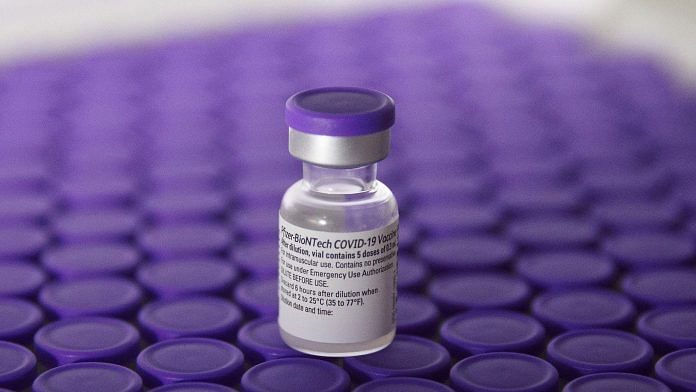New Delhi: The World Health Organization’s vaccine advisory group Tuesday recommended that the second dose of the Pfizer-BioNTech Covid-19 vaccine should be administered within 21-28 days, but added that the second dose can be spaced out by countries depending on their epidemiological concerns.
During a press briefing, the WHO’s Strategic Advisory Group of Experts on Immunisation (SAGE) Chairman, Alejandro Cravioto, said, “SAGE recommends the administration of this vaccine within 21-28 days.”
Cravioto noted that while SAGE’s recommendation was based on hard evidence, it is also important to acknowledge that countries have to make decisions based on their needs.
He said: “I think we have to be a bit open to this type of decision that countries need to make according to their own epidemiological situation. What we need in SAGE is to base our recommendation on hard evidence available to us at the time that we make our decisions. And in this sense, in general for the use of this vaccine we do recommend that we use two doses with a spacing of 21-28 days.”
The UK government’s decision to postpone the second dose of the vaccine by up to 12 weeks last week, stirred a debate among scientists and policymakers in the UK and the US.
On Tuesday, the US Food and Drug Administration came out with a statement against the UK government’s decision saying that the changes in the dosing schedule that “are not supported by adequate scientific evidence may ultimately be counterproductive to public health”.
However, during the press conference, the vaccine advisory body said that countries can space out the two doses considering the epidemiological and supply pressures.
“While we acknowledge the absence of data on safety and efficacy after one dose beyond the three-four weeks studied in the clinical trials, SAGE made a provision for countries in exceptional circumstances of vaccine supply constraints and epidemiological settings, to delay the administration of the second dose for a few weeks in order to maximise the number of individuals benefiting from a first dose,” Cravioto said.
He later added, “I think we have to be a bit open to these types of decisions which countries have to make according to their own epidemiological situations.”
Also read: Covid vaccine to reach Delhi next week — sole storage facility turns fortress in anticipation
A ‘trade-off’
Experts, however, stressed on the need for additional evidence to back these policy decisions.
“The JCI, the recommending body of the UK, has given more flexibility up to 12 weeks in consideration of the specific circumstances that the country is currently facing. We…totally acknowledge that countries may see needs to be even more flexible in terms of administration of the second dose. But it is important to note that there is very little empirical data from the trials that underpin this type of recommendation,” said SAGE executive Joachim Hombach.
WHO immunisation expert Dr Kate O’Brien noted that there was a “trade-off” of two risks with such a decision — sticking to the scientifically proven schedule as opposed to limiting access to the first dose. “Nobody expected this to be easy and we are starting to see where the road bumps are and where we need to make adjustments,” she said.
Meanwhile, Cravioto noted that SAGE does not recommend the Pfizer vaccine for international travellers unless they were in the high-risk group.
Also read: Coronavirus found in air samples of Covid hospital wards, CSIR-CCMB study says
On COVAX-SII deal
The WHO was also asked if it agreed with the March-April timeline set by the Serum Institute of India for supplying its version of the Oxford-AstraZeneca vaccine, Covishield, to COVAX countries.
The COVAX or COVID-19 Vaccine Global Access programme, a co-initiative of the World Health Organization, Coalition for Epidemic Preparedness Innovations (CEPI) and Global Alliance for Vaccines and Immunisation (GAVI), is ensuring equitable and timely distribution of the Covid-19 vaccines around the world.
“As far as Serum Institute is concerned, the COVAX facility has a contract with the Serum Institute for supply of both the AstraZeneca Oxford vaccine as well as the NovaVax vaccine, of course when that becomes available, it is still in phase 3 clinical trials. And so we expect that this will happen as there is a contract, there is a deal,” said WHO’s Chief Scientist, Dr Soumya Swaminathan.
She added: “The SII is in the process of manufacturing a large number of doses, it will be supplying the Indian government obviously to start vaccination in India but we don’t anticipate there would be delays.”
“They (SII) are submitting the dossier for the examination for EUA (emergency use authorisation), EUL (emergency use listing) and prequalification process later this week. So that’s going on…and therefore I think the Feb-March timeline is still very much what we are looking at in terms of being able to get that vaccine into COVAX and distributing it out to the countries,” said Dr Swaminathan.
Also read: India to follow ‘HCQ model’, will send Covid vaccines to neighbours after local demand is met






